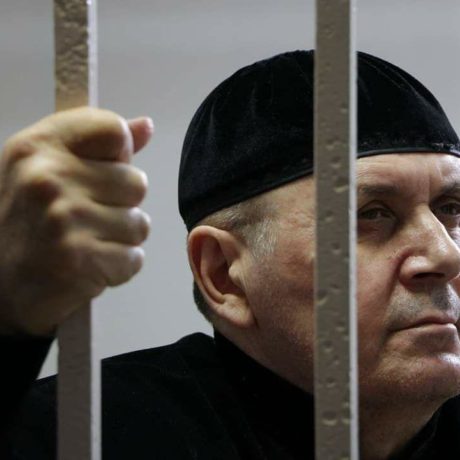After reading the verdict for nine whole hours on March 18, the judge sentenced Oyub Titiev (61) to four years in penal colony settlement. The reading began at 8:00 am to a packed courtroom. Many had to follow the case from outisde. The sentence is in accordance with the prosecutor’s initial request of four years. Titiev’s lawyers clearly state that they will appeal the verdict.
Titiev is one of very few human rights defenders to remain active in Chechnya in Russia’s tormented North Caucasus region after several of his colleagues have been silenced or even murdered for the same work. On January 9, 2018, he was charged with unlawful possession of drugs and has remained in detention since. The arrest generated an international campaign where organisations from all over the world is demanding his release.
Not surprised by the verdict
“We are not surprised by the conviction, as it underlines the absence of fundamental human rights and the unjust court system in Chechnya” says Bjørn Engesland, Secretary General at the Norwegian Helsinki Committee.
“Titiev’s case is political motivated and the evidence fabricated. He should never have been arrested in the first place, and the authorities should immediately release him”, he continues.
Still, Engesland is thanking the lawyers and other human rights defenders for the support.
“Titiev’s lawyers has done an admirable job, together with activists and other supporters, particularly from Memorial. They have been present in every stage of the process and spread information around the world”, Engeland says.

Engesland is now urging the Norwegian prime minister, Erna Solberg, to speak up for Titievs case upon her trip to Russia in April.
“We encourage the prime minister to raise the issue of the conviction of Titiev to her Russian colleagues. Norwegian and politicians from other democratic countries need to put human rights as a priority in dialogues with Russian authorities, as human rights activists, lawyers and journalists are threatened, arrested and even killed”, Engesland says.
I am certain I will be deemed guilty of the charges.
Ouyb Titiev
In a speech at the court earlier in March Titiev said that despite his inquiries, the Russian judiciary refuses to investigate his case. Prior to the trial, Titiev was therefore aware of what was to come.
“I am certain I will be deemed guilty of the charges. During the last few years’ we’ve seen that if charged with crimes here, you will not be exonerated. Neither in the court of the republic [Chechnya] or elsewhere in the country. This says something about the prosecutor’s control over the court system. If you are brought to court by the prosecutors – you will be convicted”, he said in a speech.
Titiev also encouraged colleagues from European countries to apply universal jurisdiction or other types of sanctions to convict those responsible for the crimes upon him.
Violated human rights for decades
Titiev is head of human rights organisation Memorial’s Grozny office in Chechnya, after the previous leader, Natalia Estemirova, was abducted and killed in 2009. He has since received several threats due to his work and position.
Shortly after his arrest, his lawyers’ car were attacked and the Memorial office in Dagestan, the neighbouring republic, was purposely set on fire. No one were injured, though important documents of human rights violations were destroyed. His family’s home was also demolished along with those of 38 neighbours.
Chechen authorities have violated the human rights of the republic’s citizens for decades without being punished or criticized by federal authorities. In 2017, journalists in Novaya Gazeta uncovered mass human rights violations and torture of perceived LGBTI persons, and 27 young men were found executed after having disappeared in the authorities’ investigation of a terrorist attack. Torture, disappearances and the practice of collective punishment of whole families and villages is widespread and criticized by Titiev on several occasions. Quietly he has been working to gather important documentation to secure investigation and verdicts of the perpetrators of such grave crimes.
“We have every reason to believe that Titiev was arrested due to his research of the arbitrary arrests and executions of the 27 men in December 2017. Ramzan Kadyrov, the leader of Chechnya, has issued threats towards any oppositional voices left in the republic, be it journalists or activists. After Titiev’s case is over, they will be forced to leave the country. We cannot let this become reality”, says Engesland.
International campaign for Titiev’s release
After Titiev’s arrest last year, NHC and several human rights organisations around the world demanded his release. NHC, Human Rights Watch, Amnesty International, Front Line Defenders, FIDH and the World Organisation Against Torture issued a statement for Titiev’s freedom and for the authorities to withdraw their charges against him.
The Civic Solidarity Platform, a network of human rights organisations in numerous countries has also demanded his release.
Titiev was also last year awarded the Václav Havel Human Rights Prize 2018 by the Parliamentary Assembly of the Council of Europe (PACE).
In addition, the Norwegian government has acknowledged the obstacles and dangers that human rights activists face in Chechnya:
“The dispatches of the arrest of Titiev are deeply concerning (…). Human rights defenders are highly exposed to danger in Chechnya (…). We will raise the issue bilaterally at first occasion, and work to raise the case in the OSCE and/or the Council of Europe with Norwegian support. Supporting human rights defenders is an important issue for Norway. The Ministry and I personally, will also draw attention to the case in social media, where we will express our deep concern over the arrest of Titiev, and where Russian federal authorities will be asked to take action without delay”, deputy foreign minister Audun Halvorsen responded in a letter to the NHC short time after the arrest.

